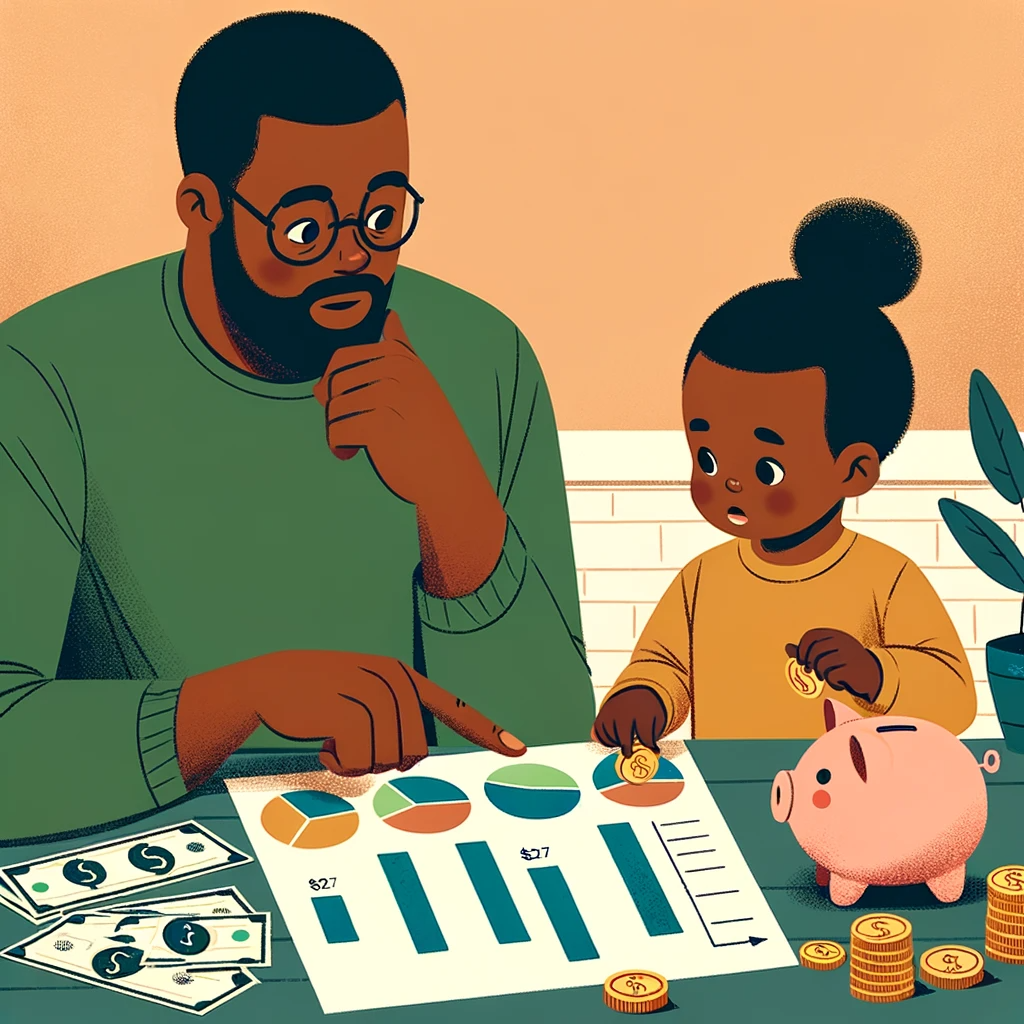Parenthood, a journey that is as demanding as it is rewarding, brings a sea of responsibilities and a chance to shape the future. While the role of mothers has been traditionally emphasized, the importance of a father’s involvement in a child’s development cannot be overstated. Common societal expectations often place fathers in the provider role, overlooking the equally significant emotional, educational, and social support they offer. This article aims to delve into the scientific and psychological aspects of a father’s role, shedding light on how a dad’s involvement enriches a child’s life in multifaceted ways.
Setting the Stage for the Importance of a Father’s Role
The dynamics of a father-child relationship profoundly affect a child’s life. From bolstering emotional stability to paving the way for a sound educational foundation, dads play a crucial role. A father’s interaction with his child from a young age cultivates a sense of security, promotes self-esteem, and significantly impacts the child’s social and emotional development.
Brief Mention of Common Societal Expectations
Traditionally, societal norms have often boxed fathers into the provider role, overshadowing the emotional and nurturing aspect of fatherhood. However, as we evolve, it’s crucial to acknowledge and celebrate the multifaceted roles fathers play in nurturing well-rounded, confident, and emotionally intelligent individuals.
Key Takeaways
| Aspect | Importance |
| Psychological Connection | Fosters emotional stability and boosts self-esteem. |
| Educational Involvement | Encourages a love for learning and academic engagement. |
| Social Development | It helps in building robust social interactions and relationships. |
| Economic Aspect | Instills financial literacy and provides financial stability. |
| Modeling Healthy Relationships | Demonstrates respect, equality, and conflict resolution. |
| Encouraging Physical Activity | Promotes a healthy lifestyle and physical fitness. |
This table outlines the significant takeaways from the article, providing a glimpse into the varied dimensions of a father’s involvement in child development. Through the subsequent sections, we will delve deeper into each of these aspects, highlighting the invaluable contributions of fathers and inspiring new dads to embrace their significant role in nurturing the next generation.
Role of a Dad in Child Development: A Historical Perspective
In tracing the contours of fatherhood, we journey back in time to understand how the role of fathers has evolved. Historically, fathers were primarily seen as providers and protectors; their involvement in child-rearing was often limited due to societal norms and expectations. The Industrial Revolution further accentuated this role, as fathers were required to work long hours away from home, detaching them from family life.
Evolution of the Father’s Role in Family
Over the decades, societal shifts have slowly but steadily changed the narrative around fatherhood. The modern dad is now recognized for being emotionally available, nurturing, and actively involved in child development. Studies show that children with involved fathers are more likely to be emotionally secure confident, and have better social connections as they grow.
Comparison with Modern-Day Expectations
Today, the expectations from fathers have diversified. They are encouraged to be equal partners in parenting, sharing the responsibilities of nurturing, educating, and providing for the family. This shift not only fosters a balanced family dynamic but also contributes to the holistic development of children, enriching their lives in immeasurable ways.
The Psychological Connection
A father’s involvement is crucial in nurturing the emotional health and well-being of a child. The psychological benefits extend beyond the early years and have a lasting impact, shaping the child’s personality and relationships in adulthood.
Emotional Development and Father-Child Bond
The bond between a father and child is unique and profoundly impacts the child’s emotional development. Fathers who are emotionally available and responsive to their child’s needs help in cultivating a sense of security, boosting self-esteem, and promoting emotional intelligence. The father-child bond also plays a significant role in how children navigate their feelings and relationships as they grow.
Impact on Self-Esteem and Confidence
A father’s affirmation and support provide a strong foundation for building self-esteem and confidence in a child. Through positive interactions, fathers reinforce a sense of self-worth in their children, empowering them to face challenges with resilience and assurance. The confidence instilled through a supportive father-child relationship is a cornerstone for the child’s social interactions and academic endeavors.
The journey of understanding the vital role fathers play in child development invites a reflection on historical perspectives and the psychological connections fostered. As we delve deeper into various dimensions of fatherhood in the following sections, we continue to uncover the profound impact fathers have on the holistic development of their children.
Educational Involvement
The education arena is where a father’s involvement can significantly buoy a child’s academic journey. From the early days of kindergarten to the challenging years of high school, a father’s support can make a remarkable difference in a child’s educational attainment and love for learning.
Fathers’ Involvement in Academic Activities
Engaging in academic activities alongside children enhances their learning experience and fosters a supportive educational exploration environment. Fathers who actively participate in their child’s education, help with homework, attend parent-teacher meetings, and encourage academic endeavors often see their children thriving academically. This active involvement sends a strong message to the child about the importance of education and instills a sense of responsibility toward their academic commitments.
Encouragement of Curiosity and Learning
Fathers can ignite the spark of curiosity in their children by exploring the world around them together. Whether it’s a visit to the museum, a walk in the park, or simply engaging in curious questioning, these interactions stimulate a child’s mind and foster a love for learning. Moreover, by promoting a questioning mind, fathers lay the groundwork for critical thinking and problem-solving skills that are invaluable in the academic realm and beyond.
Social Development
The social sphere is another crucial area where fathers profoundly impact. Through interactions within and outside the family, fathers shape their children’s social skills and relationships, laying a solid foundation for enriching social interactions throughout their lives.
The Role of Fathers in Social Interactions
Fathers often serve as the initial role models for social interactions. Through their behavior and interactions with others, children learn essential social skills such as sharing, empathy, and conflict resolution. Moreover, fathers who expose their children to a variety of social settings help them adapt to different social scenarios, enhancing their social competence and confidence in interacting with others.
Building Relationships Outside the Family
By encouraging children to build relationships outside the family, fathers help broaden their social horizons. Enrolling children in team sports, community activities, or simply arranging playdates are ways fathers can foster social development. These experiences teach children the importance of teamwork, communication, and forging meaningful relationships, skills that are crucial for personal and professional success in the long run.
The voyage through education and social interaction illuminates how fathers contribute to their children’s development. Their active involvement in academic activities and social settings not only enriches the immediate learning experience but also imparts lifelong skills and values. As we transition to the economic aspect in the following section, we continue to unravel the layers of a father’s influence in shaping well-rounded, confident, and socially adept individuals.
Economic Aspect
Navigating the economic landscape is an indispensable part of adulthood, and the preparation begins right in the family. Fathers, as traditional providers, play a pivotal role in laying the economic foundation for their children, instilling in them the principles of financial literacy and responsibility.
Providing Financial Stability
A father’s ability to provide financial stability within the family not only meets the basic needs but also creates a conducive environment for a child’s growth and development. The sense of security from a stable economic environment enables children to focus on their education and personal development without undue stress.
Teaching Financial Literacy
Financial literacy is a crucial life skill, and fathers have the opportunity to be the first financial mentors for their children. By discussing money matters openly and teaching the basics of budgeting, saving, and spending wisely, fathers lay the groundwork for sound financial habits. Engaging children in discussions about household finances or even simple money-related decisions fosters a sense of financial responsibility and prepares them for economic independence in adulthood.
Modeling Healthy Relationships
The blueprint of relationships often stems from the interactions observed within the family. Fathers, alongside mothers, play a significant role in modeling healthy relationships, thus shaping their children’s expectations and interactions in their future relationships.
Displaying Respect and Equality in Parental Relationships
Children closely observe the dynamics between their parents. When fathers display respect, equality, and open communication within the relationship, it sets a positive example for children. It teaches them the importance of mutual respect, understanding, and effective communication in maintaining healthy relationships.
Teaching Conflict Resolution
Conflict is an inevitable part of relationships. How fathers handle conflict, react to disagreements, and work towards resolution within the family setting is a learning experience for children. By modeling healthy conflict resolution strategies, such as active listening, expressing oneself calmly, and finding compromise, fathers equip their children with valuable skills to navigate conflicts constructively in their relationships.
Exploring the economic and relational dimensions of fatherhood further underscores the profound impact fathers have on their children’s lives. Through providing financial stability and modeling healthy relationships, fathers contribute to the nurturing of economically savvy and relationally competent individuals. As we delve into the encouragement of physical activity in the next section, we continue to unfold the holistic influence of fathers in fostering well-rounded individuals ready to navigate the world confidently.
Encouraging Physical Activity
Physical activity is a vital component of a healthy lifestyle, and fathers have a unique role in promoting this among their children. Through active engagement in physical activities, fathers not only contribute to the physical well-being of their children but also instill in them a love for a healthy, active lifestyle.
Promoting a Healthy Lifestyle
Fathers can be the catalysts in encouraging a lifestyle that values physical fitness and well-being. By engaging in outdoor activities, sports, and exercise together, fathers make physical activity enjoyable and a natural part of their children’s routine. This active involvement helps in developing a positive attitude towards exercise, which is likely to continue into adulthood.
Engaging in Outdoor Activities and Sports
Outdoor activities and sports provide an excellent platform for fathers to bond with their children while promoting physical fitness. The camaraderie developed on the playground, the lessons learned in teamwork, and the joy of physical movement are priceless experiences that also contribute to the child’s social and emotional development.
Conclusion
The voyage through the myriad facets of fatherhood unveils the profound and lasting impact fathers have on the holistic development of their children. From nurturing emotional stability to igniting the flames of curiosity, from modeling healthy relationships to promoting a zest for physical activity, fathers play an indispensable role in shaping the future of their children.
Motherhood Center in Houston, nestled in the vibrant River Oaks community, resonates with the essence of supporting families on this beautiful journey from pregnancy to parenting. The center provides many services, educational classes, and offerings that align with the various dimensions of fatherhood discussed in this article.
Whether embarking on the fatherhood journey or looking to enrich your parenting skills further, the Motherhood Center offers a nurturing and supportive environment. The comprehensive offerings, including parenting classes, baby doula services, and fitness classes, among others, provide a solid foundation for both mothers and fathers to thrive in their parenting roles.
- Explore the diverse childcare services offered at the Motherhood Center to support you on your parenting journey.
- Attend educational classes to equip yourself with the knowledge and skills to nurture well-rounded, confident, and socially adept children.
- Engage in the community-centric offerings like our Baby Bump Social to connect with other like-minded parents, sharing experiences and learning together.
The call to action is clear: embrace the journey of parenthood with the support and resources available at the Motherhood Center. Your proactive involvement as a father not only enriches your own life but leaves an indelible mark on the life of your child, nurturing them to grow into confident, competent, and compassionate individuals.







